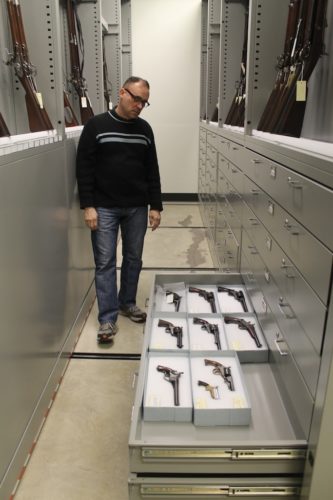What you will discover in this next post is just amazing. And it will probably make you think of the folk tale Ali Baba and the Forty Thieves, in which Ali Baba, a poor woodcutter discovers the secret of a thieves’ den, entered with the phrase “Open Sesame.”

Did you know that such a place actually exists in the USA? It is called the Center of Military History and is located 30 minutes drive outside Washington DC, at Fort Belvoir in Virginia.

… Behind a series of highly alarmed doors, long, camera-laden hallways, you enter a huge, underground and sophisticated, climate-controlled cavern-like storage room. It was built for $24 million in 2010 and it’s where the army keeps its most precious artifacts.

This room contains the army’s historic collection of weaponry stacked with priceless items and very meaningful artifact that has been worn on a military battlefield. For example, it includes Gen. Ulysses Grant’s Civil War cap, flags, canteens and cannons.
But the crown jewel of the collection is the 16,000 pieces of fine art the army owns.
The massive collection consists of donated and commissioned pieces. Much of the art was painted by soldiers who experienced their subjects in real life.

During World War I, the army began commissioning artists to deploy into the war zone and paint the scenes they observed. This practice has continued to this day. Much of the museum’s collection consists of these commissioned wartime pieces. The collection also keeps hold of valuable donated military art and historical pieces dating back to the Mexican American War.
The art tells the story of America’s wars through a soldier’s unique perspective.
Virtually every American conflict is represented from a first-hand soldier’s perspective: Vietnam, Desert Storm, humanitarian expeditions.

The collection also includes original army propaganda art, icluding beautiful Norma Rockwell originals that the army commissioned in the 1940s

The collection also has a controversial side that has never been displayed including watercolors painted by Hitler himself

A number of Hitler’s paintings were seized by the U.S. Army at the end of World War II and found a home at the center. None of the confiscated Nazi art has ever been displayed and the curators thought them too controversial for this piece.
But not a single piece in this massive collection is open to the public. Why is it kept under lock and key in a blackened warehouse? Because there is no museum to house it. The entire collection could be made accessible to the public, if the funds for a museum could be raised.
Help the Army Historical Foundation to raising the funds for the museum.
Via armyhistory.org













